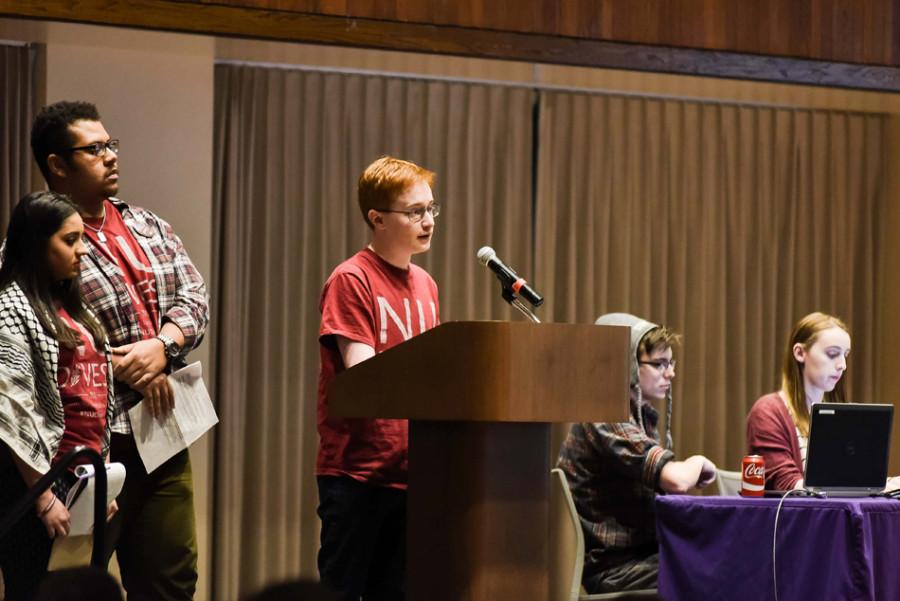Northwestern poses transparency challenges as students move forward with divestment
Weinberg junior and member of NUDivest Noah Whinston speaks during last week’s Associated Student Government Senate, during which the campaign’s divestment resolution passed. NU joins a growing number of universities that have passed such resolutions.
February 24, 2015
After the passage of Northwestern Divest’s resolution at Associated Student Government Senate last week, NU joins a growing number of universities in the United States whose students have pushed for divestment from companies allegedly involved in human rights violations in the Israeli-Palestinian conflict.
Student governments at six of the nine undergraduate colleges within the University of California system have passed resolutions calling for divestment, although the resolution was overturned this week at UC Davis. Schools within the public UC system are required to make their investment records public, unlike NU, which does not release information about its investments.
UCLA senior Ayesha Khan said having investment information on the public record was helpful to passing the resolution in her university’s Undergraduate Students Association Council.
The council passed UCLA students’ divestment resolution in November with eight votes for, two against and two abstentions.
“Actually being able to point to our endowment pool and going with this is how we’re invested in (Hewlett-Packard), this is how we’re invested in Lockheed Martin,” Khan said. “It’s much easier to have an actual factual basis for the resolution.”
After a majority of UC schools passed resolutions, the issue was taken up by the UC Student Association, a UC system-wide student council, this year. On Feb. 8, the UC Student Association passed a resolution urging the UC Board of Regents to divest from the corporations cited.
George Kadifa authored the UC Berkeley student government’s resolution, which passed in April 2013. Kadifa, who graduated from UC Berkeley in 2013, said seeking divestment from the Board of Regents was a simpler process because all funding for the UC system comes from the board.
“We weren’t divesting from something at Berkeley itself,” he said. “Because the Regents body and the UC system is public, everything is totally transparent. We knew what investments they had, we knew what they didn’t have … It made it easier to write these bills.”
For NUDivest, however, moving forward after the resolution’s passage in ASG will be more difficult without access to public investment information.
Weinberg senior and NUDivest member Dalia Fuleihan said the lack of transparency has “created more of an obstacle.”
Last week, University spokesman Al Cubbage issued a statement that University administration and the Investment Committee will “review (the NUDivest) resolution thoughtfully.” In his statement, he said NU does not directly hold shares in the six corporations NUDivest names in its resolution, but uses firms that invest in different financial mediums on the University’s behalf.
Fuleihan said there is only a small possibility NU is not indirectly invested in the six corporations. Regardless, she said, the resolution could serve a broader purpose of preventing NU from investing in similar corporations in the future.
Fuleihan said NUDivest members plan to reach out to the Investment Office.
“This is new territory for pretty much all campaigns,” she said. “Getting (the Investment Office) to cooperate is a learning process.”
Like NU, Stanford University is a private institution and is not required to publicly release its investments. After a revote, Stanford’s student government passed a divestment resolution Feb. 17, a day before it passed at NU.
Stanford sophomore Fatima Zehra, who is involved in the university’s chapter of Students for Justice in Palestine and Stanford Out of Occupied Palestine, said the campaign took a “criteria-based approach to the resolution.”
“In consideration with Stanford’s size, there’s going to be a high possibility that we are going to be invested in companies that do not practice ethical investment,” she said. “It’s not just about direct, it’s about indirect.”
Fuleihan said indirect investment does not excuse complicity in human rights violations.
“It’s very rare for universities to invest directly,” she said. “However, it does not absolve the University … the money is still going to these corporations. There are still ways to secure divestment even if you’re not directly invested and we will be exploring those avenues.”
Fuleihan said she thinks the success of the resolution and its West Coast counterparts will impact other campaigns across the country.
“It’s always very inspiring to see a campus that’s very successful,” she said. “I hope NUDivest will encourage other campuses to inspire other campaigns. We don’t work in a vacuum.”
Email: oliviaexstrum2017@u.northwestern.edu
Twitter: @olivesocean
Previous stories on this topic:
After debate, ASG Senate narrowly passes NUDivest resolution
Northwestern not directly invested in companies named in divestment resolution, University says



